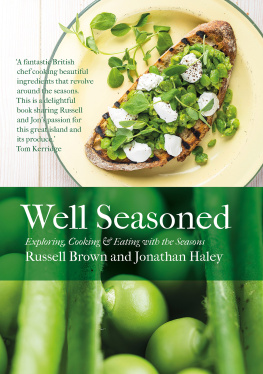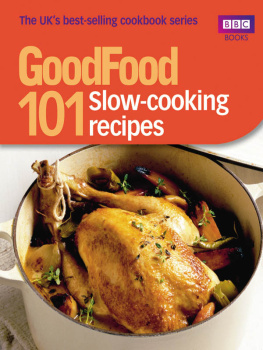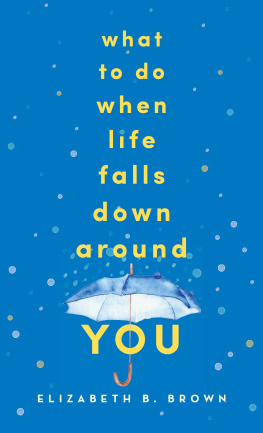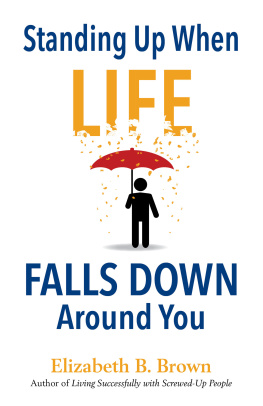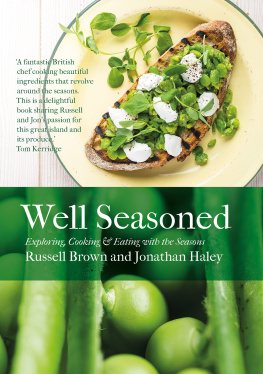Brown - Well Seasoned
Here you can read online Brown - Well Seasoned full text of the book (entire story) in english for free. Download pdf and epub, get meaning, cover and reviews about this ebook. year: 2018, publisher: Anima;Head Of Zeus, genre: Home and family. Description of the work, (preface) as well as reviews are available. Best literature library LitArk.com created for fans of good reading and offers a wide selection of genres:
Romance novel
Science fiction
Adventure
Detective
Science
History
Home and family
Prose
Art
Politics
Computer
Non-fiction
Religion
Business
Children
Humor
Choose a favorite category and find really read worthwhile books. Enjoy immersion in the world of imagination, feel the emotions of the characters or learn something new for yourself, make an fascinating discovery.
- Book:Well Seasoned
- Author:
- Publisher:Anima;Head Of Zeus
- Genre:
- Year:2018
- Rating:3 / 5
- Favourites:Add to favourites
- Your mark:
- 60
- 1
- 2
- 3
- 4
- 5
Well Seasoned: summary, description and annotation
We offer to read an annotation, description, summary or preface (depends on what the author of the book "Well Seasoned" wrote himself). If you haven't found the necessary information about the book — write in the comments, we will try to find it.
Brown: author's other books
Who wrote Well Seasoned? Find out the surname, the name of the author of the book and a list of all author's works by series.
Well Seasoned — read online for free the complete book (whole text) full work
Below is the text of the book, divided by pages. System saving the place of the last page read, allows you to conveniently read the book "Well Seasoned" online for free, without having to search again every time where you left off. Put a bookmark, and you can go to the page where you finished reading at any time.
Font size:
Interval:
Bookmark:

WELL SEASONED
Exploring, Cooking & Eating with the Seasons
Russell Brown and Jonathan Haley
www.readanima.com
 |
The complete guide to seasonal living with delicious recipes that make the most of Britains freshest and finest ingredients every month of the year: pick wild garlic, fish for mackerel, forage for elderflowers and hunt for mushrooms and learn how to cook them. Well Seasoned is perfect for anyone interested in living a holistic, seasonal life.
If youve ever wanted to know exactly when the asparagus season starts, this book is for you. If you like the idea of picking wild garlic but arent quite sure where to begin, youre in the right place. And if youre looking for fantastic recipes that make the most of Britains finest seasonal produce every month of the year, we can definitely help you.
Weve picked gooseberries in June, foraged cobnuts in October, caught cuttlefish in July and roasted venison in November. Along the way, weve learned how everything we see, eat and experience from the height of summer to the depths of winter is inextricably linked to the seasons. To date, other food writers have only told half the story. Its all very well knowing that crayfish are in season in May, but how much better to know how and where to catch them yourself? Spiced squash is the perfect Halloween dish, but so much more satisfying when youve picked your own pumpkin or spiced it with home-grown chillies.
Without learning more about seasonality and the impact it has on the world around us, seasonal food is only an abstract concept. So, this book isnt merely a guide to seasonal eating but to seasonal living.
Weve arranged this book by monthly chapters. We hope that every month (at least) youll dip into it for ideas of where to go, what to do and, most importantly, what to cook. Each month is divided into four parts:
At the start of each chapter, we suggest an outdoor experience either in your garden or the Great British countryside that captures the essence of the month. Wherever you live, get out and about to see how the world around us is hard-wired to the seasons.
Here youll find out about some of our superstar seasonal ingredients. These are the real flag-bearers for each month of the year and might only be around for a few weeks, so look out for them in your local shops, markets or hedgerows.
Dates to note in your diary for the month. Some are long-forgotten, others have evolved into the festivities we know and love today. Each one is a small but important marker in the seasonal cycle.
Lastly, Russells mouth-watering recipes to help you make the most of the months best produce. Cook, eat and drink as you explore each season.
In the Appendices youll find detailed seasonality charts as well as contact information for the various organizations we mention throughout the book. If you like the sound of a particular event or activity then these will usually be a good place to find more information.
Living seasonally means living with some uncertainty. In the modern world, were not very good at that, but its important to emphasize that this book is about living with the seasons. We cant dictate exactly when the birds should start nesting, when snowdrops might emerge or when the hedgerows will blossom. Only Mother Nature can do that. All we can do is tell you when shes most likely to.
The same goes for our food and recipes although the British seasons are actually fairly reliable, we cant know exactly when any particular ingredient will be at its best. You shouldnt feel you have to stick slavishly to the chapter headings or seasonality charts. Whether its raspberries ripening, sprouts sprouting or crayfish crawling, if something looks and feels good, then feel free to give it a go.
On a practical note, since we spend most of our time in London and Dorset, this book inevitably reflects those places as our seasonal reference points. If you live in the far South West of the country, the micro-climate of Devon and Cornwall means you have a good chance of finding any ingredient or natural phenomenon several weeks earlier than the book suggests, and if youre in Northern Scotland you could be up to a month behind.
Finally, there is an abundance of conflicting views as to exactly when spring, summer, autumn and winter officially start and end. For simplicity, we tend to use the meteorological system, which divides the year into four equal seasons, starting on the first day of March, June, September and December respectively. Obviously, nothing is truly that simple and well touch on a few of those differing opinions along our seasonal journey.
Our seasonal love affair starts with food: very simply, we believe that ingredients taste best when theyre grown in the right place at the right time of year.
Its not that we dont enjoy food and flavours from overseas youd be hard-pushed to prize a steamed pork bun out of our hands but the Great British public has become used to a diet of tasteless tomatoes and bland strawberries, simply because they can be cheaply imported all year round.
In times gone by, our lives would have been intimately intertwined with the seasons. We would have known when to harvest crops for the best yield, which fruits tasted sweetest each month and which animals or fish would provide us with the richest meat. Innovations like fridge-freezers, processing techniques and a globalized food market have changed all of that. Seasonality has largely slipped from our collective consciousness and our eating habits have become almost entirely disconnected from the annual cycle.
Should we care? It is easy to accuse us of being stuck in the past of failing to embrace change. Many of the advances we have seen have, of course, done wonders for our world. For most people, especially those of us lucky enough to live in the British Isles, food is cheaper and more accessible than it has been at any time in the past. And yet, if you buy food that is artificially grown at the wrong time of year, you are certain to be making at least some compromise whether thats in terms of taste, cost, nutrition or environmental impact.
There are weighty issues at work here and we certainly dont claim that the answer is always clear-cut. Even with todays technology, comparing things such as carbon footprints, energy consumption or nutritional content can be difficult. Nor do we suggest you need to stick too dogmatically to the principles. Theres undoubtedly a place in our cooking for well-sourced, seasonal produce from abroad, particularly those ingredients that dont thrive here. (Youll see we happily feature Seville oranges and clementines in this book, as well as using a plethora of spices and seasonings that can only be imported.)
But its also undoubtedly the case that food produced in tune with the seasons tastes as nature intended it to (and as our taste buds have evolved over millions of years to appreciate). And if it can also be locally sourced, a short supply chain necessarily means that fewer resources will be required to get it from field to fork. So, adhering to the seasonal and local principle is usually a simple and effective way to buy food with maximum flavour and minimum environmental impact.
Far from being an act of self-denial, seasonal eating is a very positive choice. We choose to forgo green beans in December or peaches in March, looking to the alternatives without any sense of sacrifice; by eating with the seasons we have the excitement of rediscovering perfectly ripe produce and exciting new flavours every month of the year.
Font size:
Interval:
Bookmark:
Similar books «Well Seasoned»
Look at similar books to Well Seasoned. We have selected literature similar in name and meaning in the hope of providing readers with more options to find new, interesting, not yet read works.
Discussion, reviews of the book Well Seasoned and just readers' own opinions. Leave your comments, write what you think about the work, its meaning or the main characters. Specify what exactly you liked and what you didn't like, and why you think so.

